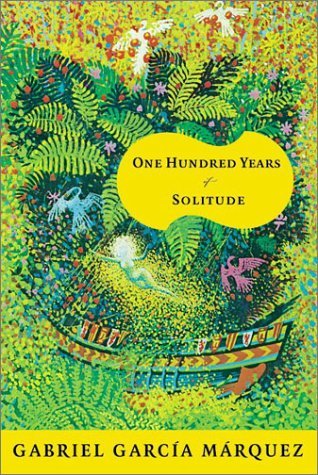One Hundred Years of Solitude: Gabriel Garcia Marquez: Perennial: Fiction: 464
One Hundred Years of Solitude chronicles the multi-generational Buendia family in the fictional town of Macondo. After founding the town, familial patriarch Arcadio Buendia sets the blueprint for an inescapable pattern of obsession, selfishness, and vice that plagues the generations of his family throughout the book. Different familial incarnations temporarily triumph and escape their history, but it is almost always short lived. Told in seamless magical realisim, this novel is at once visceral and dreamlike.
Sometimes my favorite books are ones I don't quite know what to do with when I'm finished - I don't know what to make of it or how to fully understand its themes. One Hundred Years of Solitude was a bit of that for me. All the same, I enjoyed its fantastical story telling and the way it touched on issues of nostalgia, obsessiveness, family, and the power we have over our own history - or don't as the case may be. After reading more about the history of Columbia, for which Macondo is said to be a substitute, I understood the book a bit better in terms of a critique of Latin American history.
Not really an upper... and a bit of a "must...slog...through...this... section" at times, but I'm glad I read it.
One Hundred Years of Solitude chronicles the multi-generational Buendia family in the fictional town of Macondo. After founding the town, familial patriarch Arcadio Buendia sets the blueprint for an inescapable pattern of obsession, selfishness, and vice that plagues the generations of his family throughout the book. Different familial incarnations temporarily triumph and escape their history, but it is almost always short lived. Told in seamless magical realisim, this novel is at once visceral and dreamlike.
Sometimes my favorite books are ones I don't quite know what to do with when I'm finished - I don't know what to make of it or how to fully understand its themes. One Hundred Years of Solitude was a bit of that for me. All the same, I enjoyed its fantastical story telling and the way it touched on issues of nostalgia, obsessiveness, family, and the power we have over our own history - or don't as the case may be. After reading more about the history of Columbia, for which Macondo is said to be a substitute, I understood the book a bit better in terms of a critique of Latin American history.
Not really an upper... and a bit of a "must...slog...through...this... section" at times, but I'm glad I read it.

